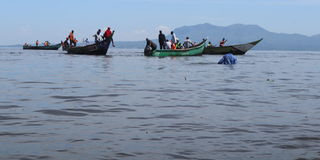Families on edge as fish stocks in Lake Victoria plunge

Fishermen engage in fishing near Rusinga Island in Homa Bay County
What you need to know:
- In Rusinga Island, Homa Bay county, two groups of fishermen have been at each other’s throats claiming sabotage in the falling stocks.
- Limited supply has, however, been a result of pollution, the use of rogue fishing methods as well as destruction of fish breeding sites.
It is not life as usual along the shores of Lake Victoria. And it has to do with dwindling fish stocks from Kenya’s largest freshwater body. The result is rising tension among communities surrounding the lake.
In Rusinga Island, Homa Bay county, two groups of fishermen have been at each other’s throats claiming sabotage in the falling stocks.
Limited supply has, however, been a result of pollution, the use of rogue fishing methods as well as destruction of fish breeding sites.
Some local companies have been accused of emitting raw effluent into the lake.
In Rusinga where the feud is threatening to divide the once bosom buddies in the fishing business, one group engages in fishing of mbuta (Nile perch) while the other catches omena.
The Nile perch group has accused their counterparts of netting omena and destroying their nets which normally happens at night when the former is out of the lake.
Conflict between the two groups started at Wayando Beach before spreading to other areas. Wayando Beach Management chairman Bernard Ooro said the destruction of fishing nets leads to huge losses.
"It lowers the quantity of fish that we get. This affects our earnings and lowers revenue to the government," he said.
Fishermen use different methods to get the delicacy out of the water before selling it to traders in different markets. Omena is usually caught at night.
Anglers use lights, which attract the fish to the water surface before they swim in nets which are later pulled out of the water when full.
Mr Ooro said fishermen who catch Nile perch on the other hand go to the lake during the day.
But their nets do not catch fish immediately like those who sell sardines.
"Nets are set in the lake for more than 12 hours so that they can catch fish," Mr Ooro said.
At Wayando Beach, fishermen normally set their nets in the afternoon and go for them the following morning.
But on the same night they are put in water, fishermen who catch sardines use their boats to go past the Nile Perch nets.
Mr Ooro said some of the boats have engines with propellers that destroy nets used to catch Nile perch.
According to him, the rate of destruction of fishing nets has increased and they now believe it is intentional.
"Boats have engines which propel the vessel as it moves in water. Cases of destruction of fishing nets were not common as we are witnessing them now meaning that whoever is operating the vessels must be aware of what is going on," he said.
Mr Dickens Omondi, a fisherman, said the destruction of fishing nets is a recipe for conflicts between the groups.
He accused whoever destroys the nets of taking advantage of the darkness to commit a crime.
"It is a security threat to some of us. Whoever destroys another person's nets can equally harm them," he said.
Other fishermen proposed the establishment of zones in the lake where fishermen can only catch one type of fish in a particular area.
Traders, too, said they are affected by the ongoing conflict.
At Wayando Beach, business operators complained of low sales as fishermen have started moving out of the beach in search of better places to fish.
"We depend on the sale of fish to earn a living. When fishermen sell their fish to other traders, they use the money to buy other items from us," said Risper Otiu, a shopkeeper.
County fisheries director George Okoth told Nation that his office is aware of the conflicts.
He said it is not the first time such cases have been reported and attributed the issue to dwindling fish stocks.
Homa Bay currently supplies at least 52,000 tonnes of fish annually, according to the fisheries department.
This is below what it used to supply more than 10 years ago and fishermen are introducing unconventional methods to try and increase the quantities of fish they get.
Mr Okoth said some fishermen are also known to nick from their colleagues.
"We have held meetings with fishermen in affected beaches and told them what to do," Mr Okoth said.
In the recommendations, fishermen were told to use beach patrol units to provide security in the lake.
At the beach, boats should be set aside to respond to emergency issues.
Mr Okoth said some members of the beach should be assigned to guard fishing gear in the lake.
"Cases of theft of fishing gears have been reported in the lake. There needs to be people who watch over the property of their colleagues to avoid theft," the fisheries director said.
County Beach Management Unit chairman Edward Oremo said his office will involve agencies such as Kenya Maritime Authority and Kenya Coast Guard Services in addressing the matter.





